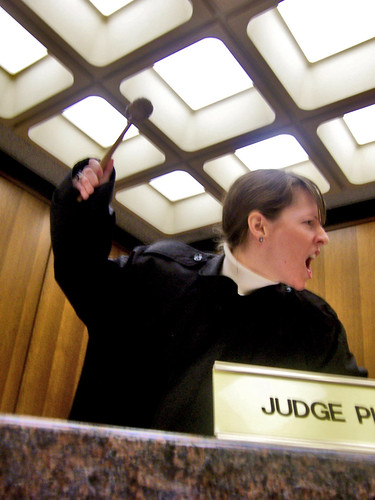We run our website the way we wished the whole internet worked: we provide high quality original content with no ads. We are funded solely by your direct support. Please consider supporting this project.
Court-of-Law Theology: How It Falls Short
Courtney “Coco” Mault via Compfight
Last week, we introduced a way of talking about theology with concentric circles. This approach is distinct from the common Western model of theology that depends upon a court-of-law framework. The following is an excerpt from Greg’s book Benefit of the Doubt regarding this:
____________________________
Within the legal strand of the Western theological tradition, God is viewed primarily as a judge, humans are thought of as guilty defendants, and Jesus is conceived of as a sort of defense attorney. Within this court-of-law framework, the atonement (that is, what Jesus accomplished on the cross) is construed as a sort of legal loophole that our defense lawyer worked out with the judge that somehow gets us off the hook by allowing the father to punish him instead of us. And our salvation, purchased by Jesus’ substitutionary death, is envisioned as an acquittal that allows us to avoid being sentenced by the Judge and consigned to prison (hell) forever.
“What’s wrong with that?” Some readers are undoubtedly wondering? “That’s the very view I was taught!” Well, it’s not entirely wrong. The New Testament does use some legal metaphors in describing God in a relationship with him. For example, God is depicted as a judge. Jesus is once referred to as our advocate before God (1 John 2:1). And the atonement is several times expressed in quasi-legal terms (e.g., Romans 3:25; Hebrews 9:15). At the same time, these legal metaphors are conceived of within a broader and more dominant covenantal context. …
You can see the pervasiveness of the court–of–law paradigm for theology in the sorts of questions Christians tend to ask. For example, I can’t tell you how many times people have asked me to specify exactly what they need to believe in order to be “saved.” Some have seriously wondered if a person who denies biblical inerrancy or who denies the earth was created in six literal days can be “saved.” A religious television personality recently suggested on his show that I was going to hell because I disagree with his interpretation of hell, and I’ve several times heard people suggest that I and anyone else who denied the “penal substitution” interpretation of the atonement were at least likely not saved. And, most disconcerting of all, as our country has become increasingly politically polarized over the last several decades, I’ve encountered more and more people who seriously question the salvation of sisters and brothers in Christ who espouse different political opinions! …
Other questions and concerns Christians commonly raise today reflect the same framework. If I had a quarter for every time I’ve been asked about “eternal security,” for example, I’d be a fairly wealthy man. Can a person lose their salvation? If so, what are the specific conditions for this qualification? What specific sins can cause one to become unsaved? …
The same holds true of the multitude of legal–type questions that I and other pastors regularly get about what exactly constitutes a particular sin. To no one’s surprise, at the top of the list are questions about what technically constitutes “fornication.” How far can a couple go before they’ve “crossed the line”? I’ve met a significant number of unmarried people who have convinced themselves that, so long as a couple stops short of vaginal penetration, they have not technically had “sex.” It took me quite a while to accept that certain unmarried couples were not joking when they would tell me some of the sexually intimate things they do while allegedly avoiding “sex”—some of which would make many married couples blush! But they are serious! This is what happens when people frame their relationship with God in terms of a legal contract. Reasoning like clever lawyers, they assume that if the acquittal-contract doesn’t explicitly close a loophole they’ve uncovered, they have the “right” to take it with impunity. (116-119)
Category: General
Tags: Benefit of the Doubt, Doubt, Faith, Theology
Related Reading

Open2013 Reflections
Both participants and leaders share about what was happening at Open2013 and some of their thoughts on Open Theism. Listen in and hear from Greg Boyd, John Sanders, Tom Oord, T. C. Moore, Jessica Kelley and many more.

Conference: Faith, Doubt & the Idol of Certainty
We’re really excited about Greg’s book, Benefit of the Doubt, coming out in September. In fact, we’re SO excited that we want to invite you all to a conference we’re holding September 27-28, 2013 at Woodland Hills Church. You can get all the information you could ever hope for by clicking here. We’ll be exploring the relationship between faith…

Drumming, Openness, Providence and Whatever
Here’s one of four arguments I offer in this essay against the view that an omniscient God must by definition know the future exhaustively as a domain of eternally settled facts.

According to Your Faith
In his sermon from this last weekend, Greg deals with Scriptures that have created some misunderstandings regarding the nature of faith. He shows how we can replace the gimmickry we normally associate with faith with something much more beautiful and lasting. You can download the sermon here. How have Greg’s thoughts on faith impacted the…

Why Bart Ehrman Doesn’t Have to Ruin Your Christmas (Or Your Faith) Part 4
This is the fourth of several videos Greg put together to refute Bart Ehrman’s claims published in the article What Do We Really Know About Jesus? We hope you’re enjoying these! They really provide a great overall approach to Biblical Criticism. If you missed the first three installments you can find them here, here and here.

On Biblical Inerrancy
Matthew Kirkland via Compfight In this essay, Peter Enns explains his views on Biblical inerrancy and the complexities encountered as evangelicals attempt to define the term. From the essay: Speaking as a biblical scholar, inerrancy is a high-maintenance doctrine. It takes much energy to “hold on to” and produces much cognitive dissonance. I am hardly…

